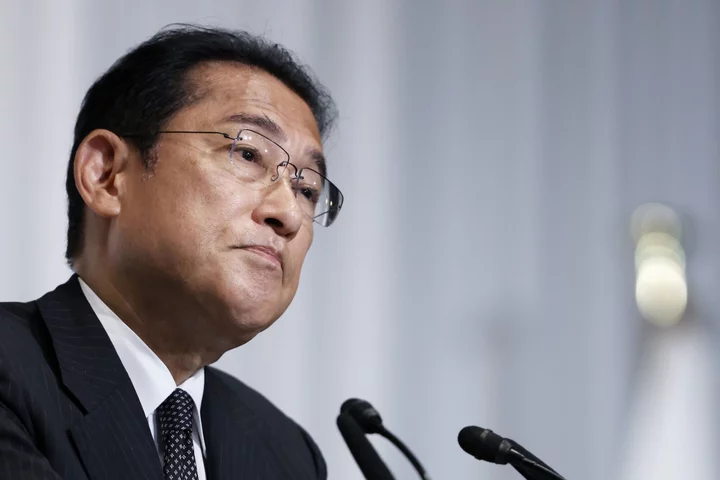A flood of criticism over a scandal that might barely raise eyebrows in many countries forced Japanese Prime Minister Fumio Kishida to fire his son and raised new doubts over the timing of the next general election.
Images taken at the prime minister’s residence show Shotaro Kishida, who has been working as his father’s secretary, standing with others on an ornate red-carpeted staircase used to take official portraits of cabinet ministers. In another, a man who doesn’t appear to be Shotaro is lying on the stairs, holding what may be a drink.
“His actions last year in an official space were inappropriate for a secretary who is in an official position, so I decided to replace him to draw a line under this,” Kishida told reporters Monday.
The images emerged in a weekly magazine last week. Bunshun Online said they were taken at a New Year’s party with relatives. The negative response to the photos has taken the edge off a leap in support for the prime minister following his hosting of Group of Seven leaders in his hometown of Hiroshima. The summit was seen as relatively successful domestically, helping fuel existing speculation he might call an early general election.
The premier had already reprimanded his son over the incident, but a poll carried out by the Asahi newspaper over the weekend showed three quarters of respondents saw Shotaro’s behavior as a problem. A separate poll by the Nikkei newspaper showed Kishida’s support had fallen by five percentage points to 47%.
“It comes across as offensive and I guess arrogant,” said Koichi Nakano, a professor of political science at Sophia University in Tokyo. “In terms of the sense that you have a rather incestuous group of people, nepotism ruling Japan, personalizing power and private usage of the public space.”
Chief Cabinet Secretary Hirokazu Matsuno said the premier hadn’t been aware of the get-together until the magazine report emerged. Matsuno added that Shotaro would not be accepting any severance payments.
Kishida’s son, who local media say is 32, previously came under fire over a report that he used a government car to go sightseeing in Paris during his father’s visit there in January. Government officials said at the time he had been engaged in government business and had not done anything inappropriate.
While Kishida himself has benefited from a relatively clean political image, his former boss Shinzo Abe was dogged by a series of scandals. In 2020 he was questioned by prosecutors but not charged over allegations his political funding group illegally subsidized cherry blossom viewing parties for hundreds of voters. He denied involvement in a sweetheart land deal given to the operator of a nationalist kindergarten who was planning to open an elementary school.
Kishida need not hold a general election until 2025, but going to the polls early would be an opportunity to renew his mandate ahead of a party leadership election in September next year. In the meantime, he faces a fight over how to pay for his bold pledges to increase spending on defense and policies aimed at bolstering the birthrate.
There are other problems overshadowing his prospects in any early vote, which will take place following a redrawing of constituency boundaries to reflect the ongoing drift from his ruling Liberal Democratic Party’s rural strongholds to urban areas.
The LDP’s decades-old coalition with the Buddhist-backed Komeito is showing cracks after the two parties fought over which of them should field candidates in newly created constituencies in Tokyo. The junior coalition party has announced it won’t work with the LDP in the capital, a blow to the many LDP lawmakers who effectively owe their seats to Komeito’s efforts to turn out the vote for them.
An early election could also limit the Bank of Japan’s room for maneuver. Governor Kazuo Ueda has tamped down market speculation about looming changes in BOJ policy, but some economists continue to warn that the central bank could take action this year, with July flagged as a potential timing. If Kishida goes to the polls, the BOJ would likely be more reluctant to make potentially market-jolting changes or policy tweaks.
Scoring a general election win in the next couple of months might also be too early, raising the risk he won’t be able to keep up the momentum over more than a year until the party leadership election, according to some analysts.
“His ultimate purpose should be to get re-elected as president of the LDP,” said Mieko Nakabayashi, a professor of politics at Waseda University and former lawmaker. “If he dissolves the Diet today or in June, there are too many things that can happen within the LDP.”
--With assistance from Yuki Hagiwara.

